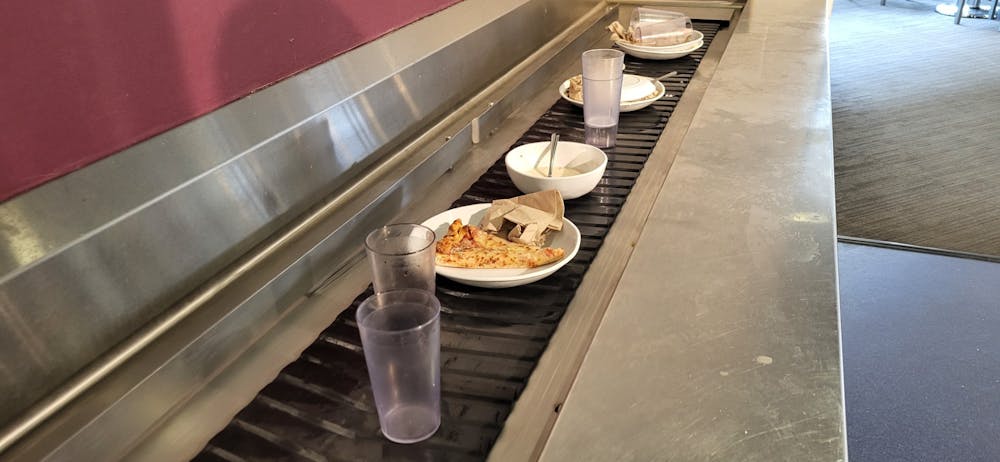A new take on food waste?
Area scraps could soon be powering plants, under grant proposal

Uneaten food and leftover scraps make their way along the conveyor belt in the East Dining hall at Central Michigan University in this November 2023 file photo. (Courtney Boyd | file)
As many as a dozen Isabella County restaurants, assisted-living facilities, schools and other commercial dining rooms could soon be turning food scraps into nutrient-rich compost.
During a work session Tuesday, the Isabella County Board of Commissioners’ Committee of the Whole got a look at a $5,000 grant that would allow the county Material Recovery Facility to purchase and distribute between 10 and 12 countertop bio-digesters. The funding, which will head to the board for a vote of final approval at its July 15 regular meeting, comes courtesy of the Mt. Pleasant Area Community Foundation.
“It’s not a dehydrator, it’s a composter for your kitchen counter, so to speak.” County Grant Writer Helen Lee told the board.
The devices hold a little more than two pounds of food scraps at a time, she said. Thanks to a robust colony of microorganisms, it takes just about a day to turn those scraps into a compost concentrate reminiscent of coffee grounds.
If the grant is approved next week, the bio-digesters will be distributed to partners throughout the area, Lee said. It’s part of a larger pilot program to test the efficacy of the devices.
“It’ll be about a five month window, where we’ll ask them to monitor how much they put in … what came out and how effective it was; how easy it was to use; the pros and cons,” Lee said. “We can put that into the research for this pilot project.”
The U.S. discards more food waste than any other nation on the planet, according to waste-management consultants Recycle Track Systems. In any given year, Americans trash about 120 billion pounds of food — roughly 40 percent of the nation’s food supply.
And all that waste takes an ecological toll.
Lettuce can take up to 25 years to break down in an oxygen-starved environment like a landfill, Silicon Valley-based waste-solutions company Power Knot found. During that time, the hypothetical waste lettuce releases environmentally dangerous gases like carbon dioxide and methane.
“One quarter of a landfill’s solid municipal waste is food scraps,” Isabella County Material Recovery Facility Director Jake Borton said. He called the environmental impact here “pretty eye opening.”
“It’s interesting, if you look at the international scale, how much this type of stuff is done internationally,” he said. “In some other countries, composting is at a higher scale than waste is.”
He said the idea was the product of a community-wide sustainability team that included the Saginaw Chippewa Indian Tribe and Central Michigan University. The hope, according to the grant application, is to place the bio-digesters around the area and spread the resulting compost in gardens throughout the county.
If the data generated during the pilot program support it, the hope is to scale up the number and size of bio-digesters serving the community.
“It’s not just us and the (Saginaw Chippewa Indian Tribe),” Borton said. “It makes good sense for us to work with that to see if we can move forward.”






